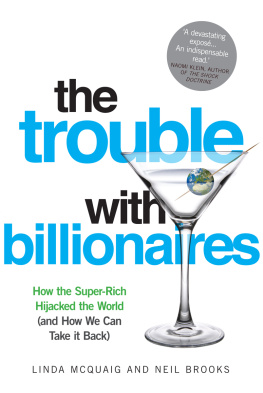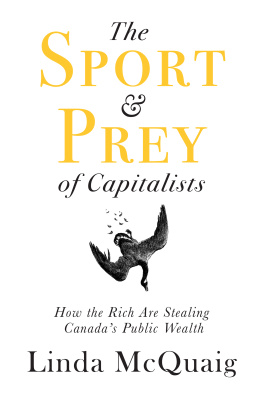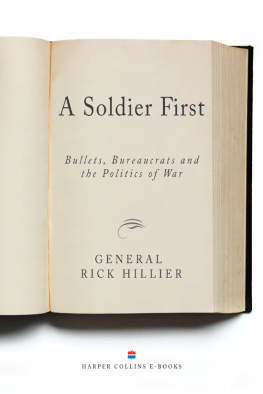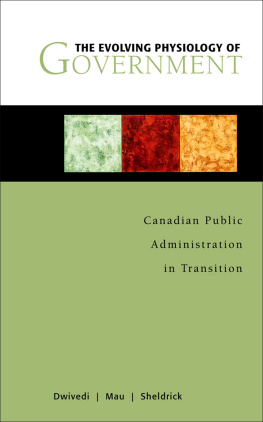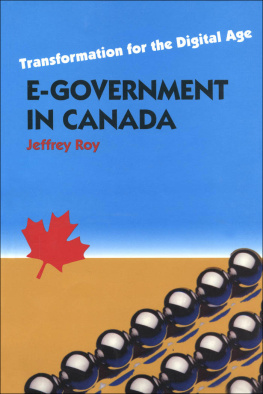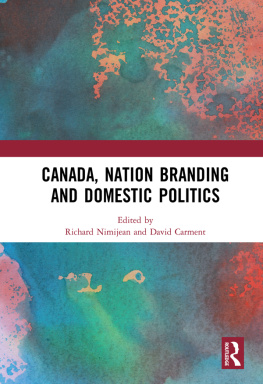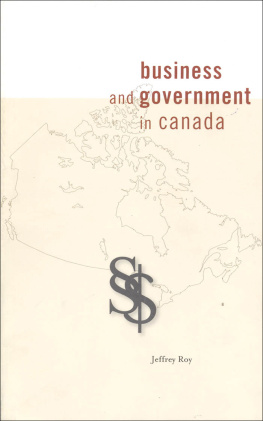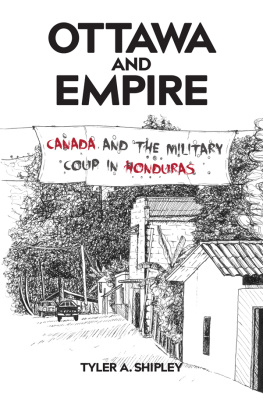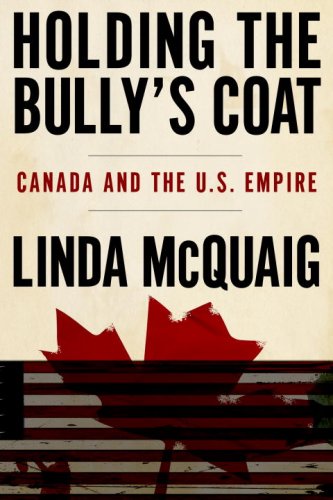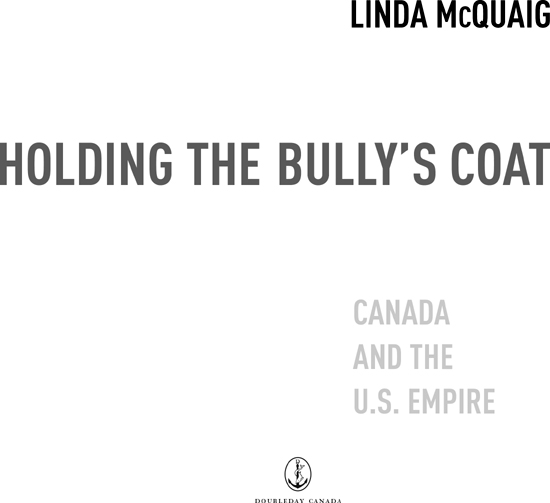ALSO BY LINDA MCQUAIG
Its the Crude, Dude:
War, Big Oil, and the Fight for the Planet
All You Can Eat: Greed, Lust and the New Capitalism
The Cult of Impotence: Selling the Myth of Powerlessness in the Global Economy
Shooting the Hippo: Death by Deficit and Other Canadian Myths
The Wealthy Bankers Wife: The Assault on Equality in Canada
The Quick and the Dead: Brian Mulroney, Big Business and the Seduction of Canada
Behind Closed Doors: How the Rich Won Control of Canadas Tax Systemand Ended Up Richer
For my wonderful brother
Don McQuaig
who will forever be missed
and, as always, for my precious
Amy
CONTENTS
6
INTRODUCTION
Although it received almost no attention in the Canadian media, the appointment of Gen. Bantz Craddock as NATOs top military commander in December 2006 had a significance for Canadians. Craddock had been in charge of the U.S.s notorious Guantnamo Bay prison in Cuba, where hundreds of suspected terrorists have been stripped of their most basic human rights in defiance of international law. His appointment as NATOs military chief meant that Canadian troops serving in the NATO mission in Afghanistan were being brought under the ultimate command of a U.S. general deeply connected to the worst aspects of American foreign policy carried out in the name of defeating terror.
This development should help dispel the comforting notion that Canada has stayed clear of the reckless and illegal course embarked on by the administration of George W. Bush in the post9/11 era. In fact, there has been a significant shift in how Canada operates in the world, as weve moved from being a nation that has championed internationalism, the United Nations and UN peacekeeping to being a key prop to an aggressive U.S. administration operating outside the constraints of international law.
In his book Lawless World, Philippe Sands, a law professor at University College London, describes the actions of the Bush administration as amounting to a full-scale assault, a war on
As Canada has backed this SUV of nations as it goes about changing the world to suit its own needs, Ottawa has repositioned Canada in the world, with implications for us as Canadians. Our close alignment with Washington also has implications beyond our borders. It is fashionable in Canadian media circles to denigrate the importance of Canada as a world player and scoff at the idea that anything we do would matter one way or another. But in fact we are a player of some significance on the global stage, owing to our reputationpartly deserved and partly undeservedas a fair arbiter and promoter of just causes, as a decent sort of country. By lining itself up so uncritically with Washington, even as the Bush administration has become a renegade in the world and highly unpopular on its own home turf, the Canadian government has played a role in enabling a regime that is considered by many around the world to be the major obstacle to peace and security.
The government of Stephen Harper has come to the aid of the beleaguered White House, which has become more and more isolated as it pursues its war on terror. On the eve of a NATO summit in Latvia in late November 2006, the growing reticence among NATO allies about the mission in Afghanistan came out into the open, with Belgian defence minister Andr Flahaut calling for an exit strategy. Flahaut gave voice to a view that had been gaining strength in Europe and elsewhere: The situation is deteriorating, he noted, and, over time, NATO forces risk appearing like an army of occupation. But with European support flagging, Canada stepped forward to defend the war, pressuring other NATO countries to make Afghanistan the top priority, and berating them for their reluctance to beef up their troop commitments. Harpers strident advocacy has been very useful to the Bush administration, since it allows the voice of another countryand one that has considerable international legitimacyto make the case for Americas war. This leaves the White House looking less isolated, to both the world community and the domestic American audience.
In tilting so strongly towards Washington, Ottawa has moved us further and further away from our European allies, with whom we actually have a great deal in common. While we are always reminded of how similar we are to Americans, theres been a tendency to overlook the compelling similarities between Canadian and European society. As Canadian political scientist Philip Resnick has argued, Canada would fit remarkably well into the European Union, were it located on the European continent. Indeed, there are similarities between Canada and Europe in our desire for strong social programs, our aspirations for greater social equality and our desire to move towards a world of peaceful co-existence among nations. Meanwhile, America has become an intensely unequal society, and one that is focused on decisively crushing its enemies in the world. Resnick also notes that Canadians share with Europeans a self-doubt, and a sense of limitations and the need for compromise in politics, while the Americans plow ahead with a fierce certainty about themselves and their rightful place at the centre of the world.
All this suggests that Canada could be making common cause with the Europeans on many frontson strengthening our social welfare systems, on championing collective international efforts to combat climate change and on standing united in opposition to U.S. actions that violate international law. Canada could have, for instance, joined the European Union in June 2006 in calling for the closure of Guantnamo Bay. Instead, however, we have lined up ever more closely with Washington, even embracing the notion of fencing ourselves off from the world behind the tight security boundaries of a Fortress North America. Our ties with Europe, once actively cultivated in Ottawa, have been largely left untended. Inside the Canadian government, theres been a significant diversion of focus and resources away from Europe and towards the United States.
This growing closeness to the United States has crept up on many Canadians a little unexpectedly. Indeed, in the past few years, most Canadians have taken satisfaction in the decision, made by the Liberal government of Jean Chrtien in February 2003, not to send Canadian troops to participate in Bushs coalition of the willing in the invasion of Iraq. As the U.S. invasion and subsequent occupation of Iraq has turned into a debacle of momentous proportions, resulting in the deaths of hundreds of thousands of Iraqis and more than three thousand U.S. troops, the Chrtien governments decision has proved extremely popular among Canadians. Theres been a tendency to forget that, at the time, some of our leading political figuresincluding our current prime minister, Stephen Harperactively favoured the U.S. invasion and encouraged our participation.
Its worth recalling how keenly Harper supported the invasion, and how he publicly rebuked the Canadian governmenteven in front of U.S. audiencesfor failing to participate in it. In a letter published in the Wall Street Journal in March 2003, Harper and Stockwell Day, now minister of public safety, sharply criticized Chretiens decision not to join the coalition of the willing, presenting it as a treacherous failure of loyalty to Britain and the U.S. This is a serious mistake. For the first time in history, the Canadian government has not stood beside its key British and American allies in their time of need. The next month, Harper told U.S. TV network Fox News that he endorsed the war, as did most Canadians outside Quebec. Outside of Quebec, I believe very strongly the silent majority of Canadians is strongly supportive. It was only later, when the war became extremely unpopular and began to look unwinnable, that Harper started to back off. Appearing on CTVs


